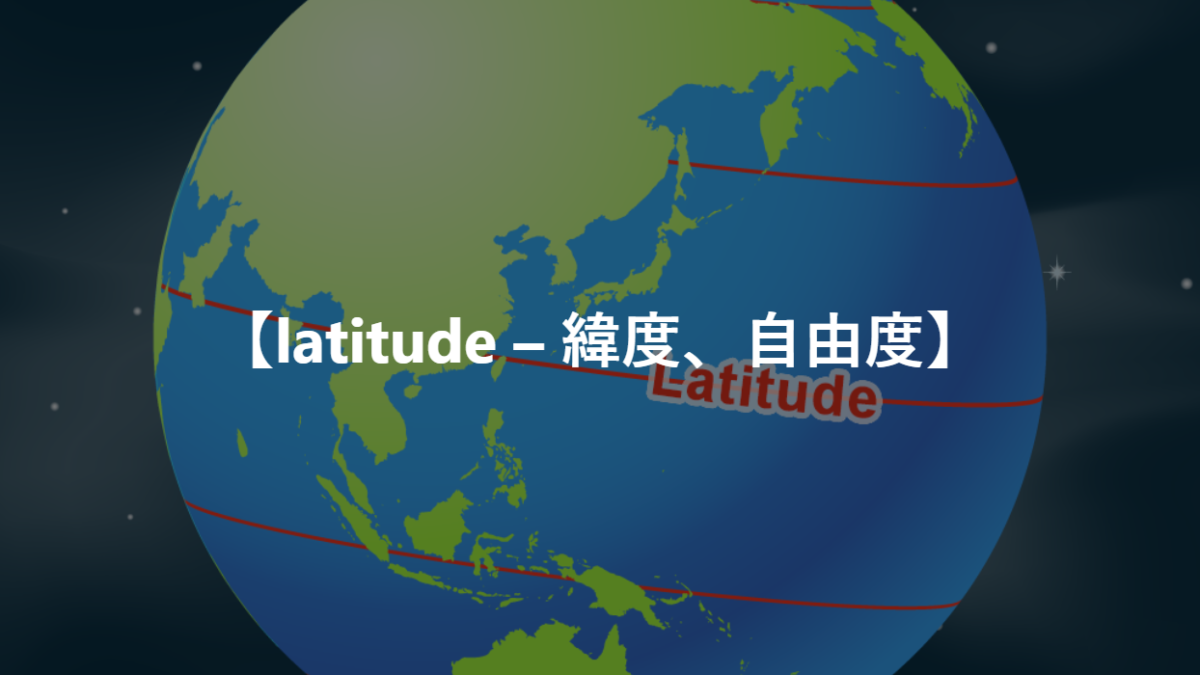語源・類義語・反対語・例文
【latitude – 緯度、自由度】という単語の語源とか由来を知っていますか?
「latitude」の語源はラテン語の「latitudo」に由来します。これは「広さ」「幅」を意味する言葉で、「latus」(広い)という単語から来ています。地理的な文脈では、地球上のある点の赤道からの距離を表す「緯度」として使われるようになりました。この用途は、地球が平面ではなく球体であるという理解が広まるにつれて発展しました。
一方で、「latitude」が「自由度」という意味で使われる場合は、比喩的な用法です。この場合、人が行動や選択をする「幅」や「余地」を指すために使われます。つまり、どれだけの自由があるか、どれだけの選択肢があるかを示すのに用いられます。この二つの意味は、どちらも「幅」や「広がり」という基本的な概念に根ざしています。
The word “latitude” originates from the Latin “latitudo,” which means “width” or “breadth” and comes from the word “latus,” meaning “wide.” In a geographical context, it has come to be used as “latitude,” indicating the distance of a point on Earth from the equator. This usage evolved as the understanding that the Earth is not flat but spherical became more widespread.
On the other hand, the use of “latitude” to mean “freedom” is a metaphorical one. In this sense, it is used to indicate the “scope” or “leeway” a person has to act or choose. In other words, it signifies how much freedom or how many options one has. Both meanings are rooted in the basic concept of “width” or “extent.”
この単語の類義語・反対語を教えてください。
類義語:
- 緯度の類義語:
- Parallel: 平行線、特に地理的な文脈で使用される赤道に平行な線を指します。
- Degree: (地理的な意味での)度数、緯度の単位として使用されます。
- 自由度の類義語:
- Freedom: 自由、制約が少ない状態を表します。
- Leeway: 余地、特定の行動を取るための空間や時間の余裕を指します。
- Flexibility: 柔軟性、状況に応じて変化や適応が可能であることを意味します。
- Discretion: 裁量、個人の判断による行動の自由を指します。
反対語:
- 緯度の反対語:
- この文脈では、緯度の直接的な反対語はありませんが、「Longitude」(経度)が緯度と異なる地理的な寸法を表します。
- 自由度の反対語:
- Restriction: 制限、ある行動や選択が限定されている状態を意味します。
- Constraint: 制約、行動や選択の自由を制限する条件や状況を指します。
- Limitation: 限界、可能な行動や状況の範囲が制限されていることを示します。
- Obligation: 義務、特定の行動を取ることが必須である状況を意味します。
この単語に似た単語で間違いやすい単語はありますか?
- Longitude: 「longitude」は「経度」と訳され、地球上の位置を表す際に緯度と並んで使われます。しかし、「latitude」が赤道からの距離を表すのに対し、「longitude」は本初子午線からの距離を表します。これらはよく一緒に使われますが、表している地理的な次元が異なります。
- Altitude: 「altitude」は「高度」と訳され、海面からの高さや地点の標高を表します。高度と緯度はともに地理的な位置を示す単語ですが、緯度が水平方向の位置を示すのに対し、高度は垂直方向の位置を示します。
- Attitude: 「attitude」は「態度」や「姿勢」と訳され、人の考え方や感じ方、行動に対する姿勢を指します。発音が似ているために混同されやすいですが、意味合いが大きく異なります。
この単語を使った例文を5つほど教えてください。
The child tried to imitate her favorite cartoon character by mimicking their catchphrases and gestures.
(その子は好きなアニメキャラクターを真似て、彼らの決め台詞やジェスチャーを真似しようとしました。)
The artist was able to imitate the style of the famous painter, capturing the essence of their brushwork.
(その芸術家は有名な画家のスタイルを模倣し、彼らの筆使いの本質を捉えることができました。)
The comedian had a talent for imitating various celebrities, entertaining the audience with spot-on impressions.
(そのコメディアンはさまざまな有名人の真似をする才能があり、的確なものまねで観客を楽しませました。)
The fashion industry often sees trends imitated and replicated by different brands and designers.
(ファッション業界では、異なるブランドやデザイナーによってトレンドが模倣され、複製されることがよくあります。)
The goal of the art class was to imitate the style of a famous painting, allowing students to learn various techniques in the process.
(美術の授業の目標は有名な絵画のスタイルを模倣することであり、その過程で生徒がさまざまな技術を学ぶことができました。)
【latitude – 緯度、自由度】のコロケーション
- Geographical latitude(地理的緯度): この表現は、地球上の特定の場所が赤道からどのくらい離れているかを示す場合に使われます。地理的な文脈で用いられ、「緯度」が地球の表面上での位置を特定するのに役立っています。
- High latitude(高緯度): 高緯度は、赤道から遠く離れた地域、つまり北極または南極に近い地域を指します。この表現は、特に気候や環境、生活習慣が大きく異なる高緯度地域に言及するときに使用されます。
- Latitude for action(行動の自由度): 「行動の自由度」を意味し、個人や組織が特定の状況や環境内で行動する際の自由の範囲を表します。ビジネスや管理の文脈でよく使用される表現です。
- Give/take latitude(自由度を与える/取る): 人に行動の自由を与えるか、または制限することを意味します。このフレーズは、親が子供に対して、または管理者が部下に対して、どれだけの自由を認めるかについて言及する場合などに使われます。
- Latitude of interpretation(解釈の自由度): この表現は、あるテキストや規則がどれだけ異なる解釈を許容するか、または個々の解釈にどれだけの柔軟性があるかを示します。法律や文学の分析など、さまざまな文脈で用いられます。
「latitude」は英語で「緯度」または「自由度」を意味する言葉です。この単語は、地理的な文脈だけでなく、行動や解釈の範囲を示す際にも用いられます。
まずは、Geographical latitudeです。この表現は、「地理的緯度」と訳され、地球上のある地点が赤道からどれだけ離れているかを示す際に使われます。地理学や航海ではこの用語が非常に重要です。
次に、High latitudeについてです。これは「高緯度」という意味で、特に赤道から遠く離れた、寒冷な地域を指します。この用語は気候や極地探検の文脈でよく使われます。
そして、Latitude for actionです。これは「行動の自由度」を意味し、個人や組織が持つ行動の余地を指します。管理や意思決定の文脈で頻繁に用いられる表現です。
Give/take latitudeというフレーズもあります。これは、自由度を「与える」または「取る」という意味です。人々に対して、特定の行動を自由に行う許可を与えたり、その自由を制限したりする状況を表します。
最後に、Latitude of interpretationに触れます。これは「解釈の自由度」という意味で、法律や文学など、テキストの異なる解釈が可能な範囲を示す際に使用されます。
これらのコロケーションを通じて、「latitude」という単語がさまざまな文脈でどのように使用されるかが理解できました。緯度に関する表現は地理的な位置を特定するために、自由度に関する表現は人々の行動や解釈の範囲を示すために使われます。
“Latitude” is a word in English that means “latitude” or “freedom.” This word is used not only in a geographical context but also to indicate the range of actions or interpretations.
First, there is Geographical latitude. This expression is translated as “geographical latitude” and is used to show how far a certain point on Earth is from the equator. This term is very important in geography and navigation.
Next, we have High latitude. This means “high latitude,” referring especially to regions far from the equator, in colder areas. This term is commonly used in the context of climate and polar exploration.
Then, there is Latitude for action. This means “freedom of action,” referring to the leeway individuals or organizations have for their actions. This expression is frequently used in the context of management and decision-making.
There is also the phrase Give/take latitude. This means giving or taking freedom, representing the situation where people are allowed or not allowed to act freely in certain activities.
Lastly, we discuss Latitude of interpretation. This means “freedom of interpretation,” used when showing the range of different interpretations possible for a text, in law, literature, etc.
Through these collocations, we can understand how the word “latitude” is used in various contexts. Expressions related to latitude are used to determine geographical positions, while those related to freedom are used to indicate the range of people’s actions or interpretations.
latitudeを使った文法問題
- 空所に入る最も適切な単語を選びなさい。
The higher the _, the colder the climate tends to be.
(a) latitude
(b) latitudinal
(c) latitudinally
(d) latitudinous
解答と解説: 正解は (a) latitude。
空所には名詞が必要です。latitudeは「緯度」という意味の名詞です。
- 次の文の誤りを一つ選び、訂正しなさい。
The manager gave her team a great deal of latitude in how they approached the project.
解答と解説: 誤りはありません。
latitudeはここでは「自由度」という意味の名詞として使われており、文法的に正しいです。
- 次の単語群を並び替えて意味の通る文を作りなさい。
latitude / The / allows / for / teacher / students / creativity / some
解答と解説: The teacher allows students some latitude for creativity。
「先生は生徒にある程度の創造性の自由を認めている」という意味になります。
- latitudeを用いて、ある組織の方針の柔軟性について述べる英文を一つ書きなさい。
解答例: The company’s policy on remote work offers employees considerable latitude in choosing their work hours。
「その会社の在宅勤務に関する方針は、従業員が労働時間を選択する上でかなりの自由度を与えている」という意味になります。
- 次の文のlatitudeと同じ意味で使われている単語はどれか?
(a) restriction
(b) limitation
(c) autonomy
(d) constraint
解答と解説: 正解は (c) autonomy。
latitudeは「自由度」という意味で、autonomyは「自律性、自主性」という意味です。

